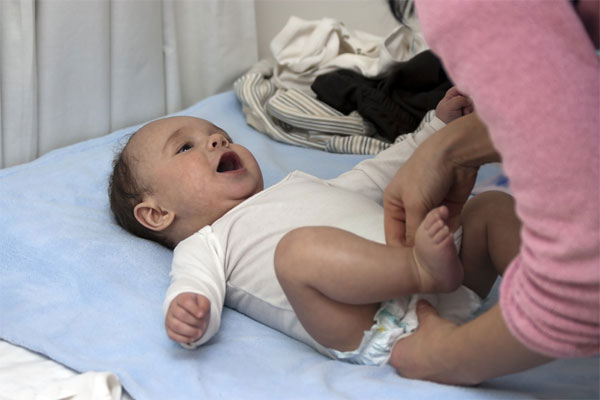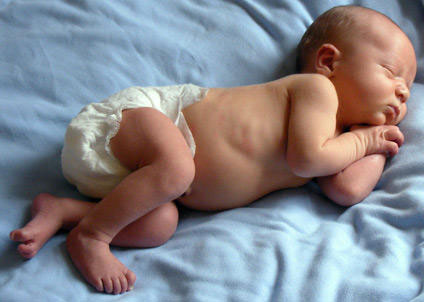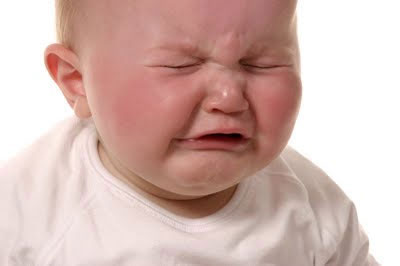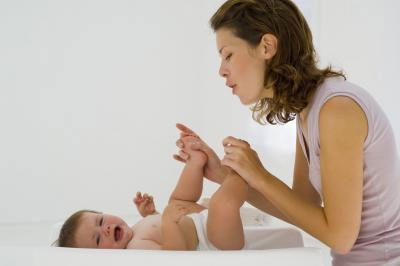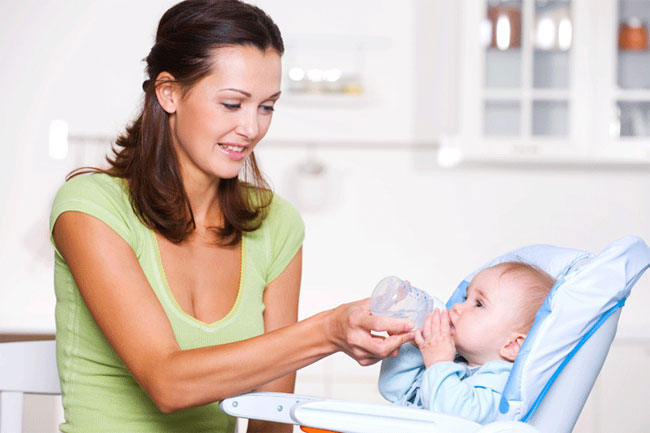Babies frequently urinate. The colour and frequency of urine can determine any underlying problem. Read on to know more.What if my baby urinates less than 7 times in a day?
You should be concerned if your baby urinates less than 7 times in a 24 hour period. This could signify that the baby is not getting enough fluids. This point is even more important if your baby is exclusively breastfed, because it could signify that she is not getting enough
breastmilk. Before you take any drastic steps (of introducing artificial milk or water), please discuss this issue with your doctor. He will know your baby and her
feeding habits best, and will be able to advise accordingly.
What if my baby's urine is yellow?
If you already started your baby on solids, but not yet on water, it could indicate that you need to start giving water to your baby. If your baby is already on solids, it could indicate that she is not getting enough fluids, and so you need to make a concerted effort in increasing her fluid intake. It is also important that you discuss this issue with your doctor because yellow urine may indicate other problems (like jaundice, etc) also.
Signs of urinary problems in babies
If you suspect urinary trouble in babies you need to look for symptoms like changes in colour, odour and frequency. She may also complain of pain while passing urine. These are some of the tale tell signs that should alarm you of a probable urinary tract infection.
Causes behind urinary troubles
In most of the cases, bladder infection result in problems with pee. Girls are known to be most susceptible to such infections compared to boys. Dehydration is said to be another cause behind changes in smell or colour of urine.
Urinary blockage in babies
Urinary blockage means little urine or no urine at all when the newborn leaves the hospital. As part of the examination, your doctor shall check for enlarged kidney or closed urethra that might be an indication of urinary blockage. Even though the blockage may not appear apparent in the initial days, here are some other symptoms that you need to look for:
- Vomiting
- Diarrhoea
- Irritation
- Nausea
- Fever
- Dark coloured and foul smell in urine
In case of these symptoms, you need to see a doctor. If your child is around 2 months and suffering from fever, she must be taken to the doctor as early as possible. You may also be asked to carry
urine samples with you for examination.
When you should see a doctor?
You should notify the doctor if you find these conditions. You must also get in touch with your doctor if you find your baby showing symptoms of fatigue, fever or extreme pain. Visiting a doctor shall be a good way of ruling out possibilities of an infection.
Diagnosis for urine blockage in babies
Ultrasound, voiding cystourethrogram (VCUG) and radionuclide scan are some of the common imaging methods that are used by doctors to diagnose urine blockage in babies. In case if the urine blockage is diagnosed, doctors may suggest suitable treatment with antibiotics or surgery in some cases.
Diagnosis for urine blockage before the birth of baby
Diagnosis is possible even after birth of your baby. Here are some of the procedures followed:
Ultrasound scans
Transducer is a device used for performing ultrasound scans that brings picture of the organs. This procedure is carried on by an obstetrician or a radiologist in the outpatient centre of the health care provider.
Amniocentesis
During this procedure amniotic fluid is removed from your womb for examination. A needle is inserted into the uterus through the abdomen to collect small sample of amniotic fluid. The cells from the fluid are then tested. An ultrasound is used to get actual location of the baby. The tests performed helps determining development of lungs or determine if she has any birth defects.
Chorionic Villus Sampling
This refers to the process of removing small tissue traces from the placenta to carry out necessary tests. This is done in the office of a health care provider and you need not go under aesthesia for this. An ultrasound is done to guide a needle or tube through the abdomen or vagina to the placenta. Cells are removed for analysis. The tests performed helps determining if the baby is suffering from any birth defects.
Rather than panicking you in fact can do a lot to help your baby come out of a situation like this. You can begin by flushing out things from her system by offering plenty of fluids after consulting your doctor. If you think your baby has a bladder infection, you must not overdo bubble baths. Soaps too can make irritations worse. The best you can do is, take her to the doctor to get rid of the infection as early as possible.

















